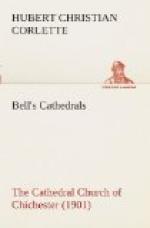[34] Matt. Paris.
[35] See Walcott, p. 15, note c.
[36] See Stephens, p. 61, cf. Murray’s
“Chichester.”
Ralph’s successor was Richard of Wych (1245-1253), generally called St. Richard. He had studied under Edmund and Grosseteste at Oxford, and also in Paris and Bologna. Returning from Europe, he became Chancellor of the University of Oxford, then of the diocese of Canterbury. Having withdrawn again to France, he was ordained priest at Orleans, and then worked as vicar at Deal, from which post he was called upon to occupy again his earlier office at Canterbury. Then came his appointment to Chichester. The canons had elected Robert Passelew, but the archbishop objected. Henry III., having supported the first nominee, disputed Richard’s election. Meanwhile the king appropriated the temporalities for two years. Richard appealed to Innocent IV., who confirmed the appointment and consecrated Richard at Lyons in 1245. This did not end the difference, for on the new bishop’s return he was obliged to accept the hospitality of his clergy, the king being still hostile. But he did not allow these difficulties to interfere with his attention to episcopal duty, for he walked throughout the diocese, organising and teaching as he went. In his leisure he followed the pursuits of his youth, and spent his spare time in farming and gardening. He was an excellent man, whose peculiar sanctity rests largely upon his having succeeded in doing the duties some of his predecessors had disregarded, and for a generosity which outran his income. Accepting that law which the papacy had added to those of Christianity, he treated the married clergy with the severity his sense of duty and obedience urged, for he deprived them of their benefices, and their wives were denied the offices of the Church both before and after death. Any bequests to them by their husbands, he declared, should be confiscated, and the funds derived by this means devoted to the needs of the cathedral building Rather inconsistently he taught the beneficed clergy that they should use hospitality and charity; but like another Malachi, he reminded men that to withhold




